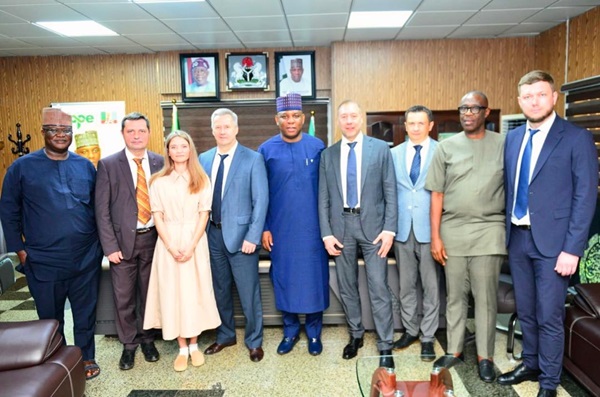
The Minister of Steel Development, Prince Shuaibu Audu has revealed that the Federal Government is on the verge of engaging a consortium led by the original developers of the Ajaokuta Steel Complex Limited (ASCL), Tyamzhpromexport (TPE) – which comprises a team from Russia’s TPE/Rostec, Novostal and Nigeria’s Proforce – on discussions about the revival of the complex.
At the meeting which took place on April 25, 2024, in Abuja, the minister urged the consortium to put together a blueprint for the revival of the steel plant within the shortest possible time. This is in line with President Bola Ahmed Tinubu’s ‘Renewed Hope’ agenda, which aims to ensure the production of steel in Nigeria and industrialisation of the country through the steel sector before the end of the President’s first term in office.
The Ajaokuta Steel Plant is of strategic importance to Nigeria’s economy, as it has the potential to create thousands of jobs and reduce the country’s dependence on imported steel. However, the plant has been plagued by years of neglect and abandonment due to mismanagement, corruption and lack of funds.
Following the meeting, the minister plans to visit Moscow on a formal invitation from TPE and other consortium partners to discuss further and secure funding of around $2 billion required for the revival of the entire steel plant. The minister thanked the Embassy of the Russian Federation in Nigeria for facilitating the meeting with the TPE Consortium. The consortium’s success will be a monumental achievement in driving Nigeria’s economy through industrialisation.
The leader of the consortium, Mr. Sergei Egorov commended the minister for putting together the consortium for the resuscitation of the steel plant. Egorov and his team of technical experts had earlier gone on a tour of the Steel Complex and noted that the plant was still in a state of possible resuscitation. They expressed interest in putting together a business case for the government.
“We came with our technical experts and are quite impressed at the current state of the Ajaokuta Steel Plant. We would do a full technical audit of the plant and then take a final decision. We are happy to come on board the resuscitation of the steel plant for the benefit of Nigerians,” Egorov said.
Deputy Head of the Russian Embassy in Abuja, Mr. Valery Shaposhnikov also commended the potential partnership, which he said would be carefully reviewed for the mutual benefit of both countries. He added that this is the first time since the Shehu Shagari administration in 1979 that a Nigerian government is showing great political will in getting the Steel Plant operational again.
The revival of the Ajaokuta Steel Plant will have a positive impact on Nigeria’s economy, as it will create jobs, provide raw materials for local industries, and reduce the country’s dependence on imported steel. The steel plant has the potential to produce 1.3 million tonnes of steel annually, which will be a significant boost to the country’s economy.
The Minister of Steel Development is committed to ensuring the revival of the Ajaokuta Steel Plant and has been working tirelessly to secure funding and technical expertise to make it happen. This is a critical project that will transform Nigeria’s Steel Sector and drive the country’s industrialisation agenda.
A statement by the ministry’s head of press and public relations, Salamotu Jibaniya said the partnership between the Nigerian government and the TPE Consortium is a step in the right direction towards the revival of the Ajaokuta Steel Plant.
“The project has the potential to create jobs, boost the economy and reduce Nigeria’s dependence on imported steel. The Minister of Steel Development and his team are working hard to ensure the success of the project and we can only hope that their efforts will yield positive results.”


